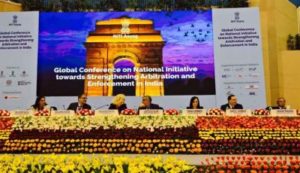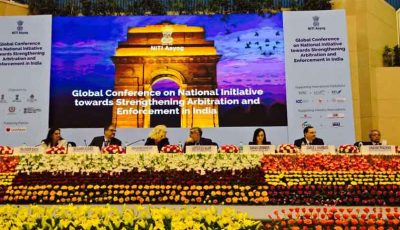The first ever Global Conference to Strengthen Arbitration and Enforcement in India held in New Delhi. The three day long conference titled, “National Initiative On Strengthening Arbitration And Enforcement In India” from October 21st to 23rd, 2016 is being launched by the Government and Judiciary as a major initiative to change the face of dispute resolution in India.
About Arbitration
Arbitration, a form of alternative dispute resolution (ADR), is a technique for the resolution of disputes outside the courts. The parties to a dispute refer it to arbitration by one or more persons and agree to be bound by the arbitration decision. A third party reviews the evidence in the case and imposes a decision that is legally binding on both sides and enforceable in the courts.
- Arbitration is often used for the resolution of commercial disputes, particularly in the context of international commercial transactions. In certain countries such as the United States, arbitration is also frequently employed in consumer and employment matters, where arbitration may be mandated by the terms of employment or commercial contracts.
- Arbitration can be either voluntary or mandatory although mandatory arbitration can only come from a statute or from a contract that is voluntarily entered into, where the parties agree to hold all existing or future disputes to arbitration, without necessarily knowing, specifically, what disputes will ever occur and can be either binding or non-binding.
- Non-binding arbitration is similar to mediation in that a decision cannot be imposed on the parties. However, the principal distinction is that whereas a mediator will try to help the parties find a middle ground on which to compromise, the (non-binding) arbitrator remains totally removed from the settlement process and will only give a determination of liability and, if appropriate, an indication of the quantum of damages payable. By one definition arbitration is binding and non-binding arbitration is therefore technically not arbitration.
About the Conference :
The three-day-long conference titled, “National Initiative On Strengthening Arbitration And Enforcement In India” is being launched by the government and judiciary as a major initiative to change the face of dispute resolution in India.
- NITI Aayog, Ministry of Law and Justice, DIPP, National Legal Services Authority, International Center for Alternative Dispute Resolution, National Institute of Labour Economics Research and Development have collaborated to make India the centre of arbitration.
- Also for the first time six leading international arbitral institutions (HKIAC, ICC, KLRCA, LCIA, PCA and SIAC) and all major industry associations (FICCI, PHD Chamber, CII and ASSOCHAM) have come together to drive this initiative.
- The conference seeks to provide impetus to commercial arbitration in India, which is fast gaining pace across the world, for faster, more efficient dispute resolution outside the court room.
- President Pranab Mukherjee inaugurated the conference while Prime Minister Narendra Modi delivered a valedictory address the conference had Chief Justice of India Justice T S Thakur as its patron-in-chief.
- Chief Justices of six countries are participating at the first ever Global Conference on Arbiration in India to share their Distinguished Jurist Fali Nariman and William Rowley, QC, Chairman, LCIA Board are amongst the keynote speakers.
- The best minds from Indian and international legal bodies, corporate houses and the legal fraternity are participating in the Conference.
- The Conference will serve as a platform for discussing critical issues, sharing experiences on the best international practices and creating a roadmap to strengthen arbitration and its enforcement in the country.
- The Conference have 7 intensive brainstorming technical sessions. These will dwell on different facets to strengthen institutional arbitration and ensure a facilitative judiciary to encourage Indian and foreign parties to arbitrate in India.
- More than 1000 experts and Government functionaries are expected to participate in the Conference besides 1200 students and faculty from various law colleges.





